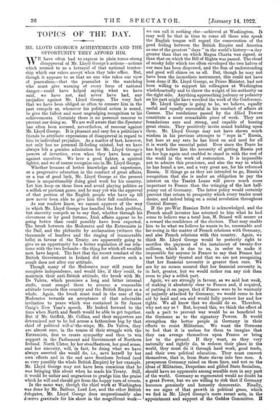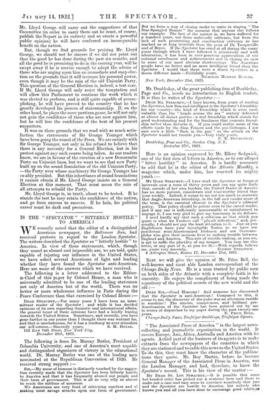TOPICS OF THE DAY.
MR. LLOYD GEORGE'S ACHIEVEMENTS AND THE OPPORTUNITY THEY AFFORD HIM.
WE have often had to express in plain terms strong disapproval of Mr. Lloyd George's actions—actions which seemed to us a betrayal of that national trustee- ship which our rulers accept when they take office. But, though it appears to us that no one who takes our view of journalism—that the journalist is the watchdog who must give warning of every form of national danger—could have helped saying what we have said, we have not, and never have had, any prejudice against Mr. Lloyd George. The very fact that we have been obliged so often to censure him in the past compels us, whenever his political action is sound, to give the fullest and most ungrudging recognition to his achievements. Certainly there is no personal rancour to prevent our doing so. We are well aware that the Spectator has often been accused, nevertheless, of rancour against Mr. Lloyd George. It is pleasant and easy for a politician's friends to attribute expressions of disapproval in regard to him to individual prejudice. As a matter of fact, however, not only has no personal ill-feeling existed, but we have always felt a genuine admiration for Mr. Lloyd George's powers of invective, even when they have been used against ourselves. We love a good fighter, a spirited fighter, and we of course recognize one in Mr. Lloyd George. Whether because of better knowledge and experience, or a progressive education in the conduct of great affairs, or a run of good luck, Mr. Lloyd George at the present time is unquestionably doing good work for his country. Let him keep on these lines and avoid playing politics as a selfish or partisan game, and he may yet win the approval of that portion of the English people who have up till now never been able to give him their full confidence.
As our readers know, we cannot approve of the way in which Mr. Lloyd George has handled the Irish problem, but sincerity compels us to say that, whether through his cleverness or by good fortune, Irish affairs appear to be going better than could possibly have been expected. The break between the Moderates and the Extremists in the Dail, and the plebiscite by acclamation (witness the thousands of bonfires and the ringing of innumerable bells) in favour of the Treaty, are apparently going to give us an opportunity for a better regulation of our rela- tions with the two Irelands—the thing for which all sensible men have hoped. The fact that the recent conduct of the British Government in Ireland did not deserve such a result does not alter our attitude.
Though many of the Moderates may still yearn for complete independence, and would like, if they could, to maintain their anti-British attitude, the break with Mr. De Valera, which promises a long and bitter internal strife, must compel them to assume a reasonable attitude towards this country and the British Empire as a whole. Again, the break must tend in the case of the Moderates towards an acceptance of that admirable invitation to peace which was contained in Sir James Craig's New Year's speech. He looked forward to the time when North and South would be able to get together. But if Mr. Griffith, Mr. Collins, and their • supporters are determined not to be led across a fathomless bog by that chief of political will-o'-the-wisps, Mr. De Valera, they are almost sure, in the course of their struggle with the Extremists, first to create sympathy and then to win support in, the Parliament and Government of Northern Ireland. North Ulster, by her steadfastness, her good sense, and her sincerity, will; in fact, be doing what we have always asserted she would do, i.e., save herself by her own efforts and in the end save Southern Ireland (and so very possibly the whole British Empire) by her example. Mr. Lloyd George may not have been conscious that he was bringing this about when he made his Treaty. Still, it would be unfair and ungracious to grudge him the praise which he will and should get from the happy turn of events. In the same way, though the chief work at Washington was done by Mr. Balfour, Lord Lee, and the other British delegates, Mr. Lloyd George does unquestionably' also deserve gratitude for his share in the magnificent work— we can call it nothing else—achieved at Washington. It may well be that in time to come all those who speak the English tongue will regard the consecration of the good feeling between the British Empire and America as one of the greatest "days " in the world's history—a day greater than that on which Magna Charta was signed, or than that on which the Bill of Rights was passed. The cloud of smoky folly which too often enveloped the two halves of our race has been dispersed, and the Sun of understanding and good will shines on us all. But, though he may not have been the immediate instrument, this could not have been done if Mr. Lloyd George, as Prime Minister, had not been willing to support his colleagues at Washington wholeheartedly and to throw the weight of his authority on the right side. Anything approaching jealousy or pedantry on his part might have wrecked the work of the Conference. Mr. Lloyd George is going to be, we believe, equally useful and equally successful in his conduct of affairs at Cannes. The resolutions passed by the Allied Powers constitute a most remarkable piece of work. They are foundations sure and strong, and capable of bearing great strain. They positively invite sound building upon them. Mr. Lloyd George may not have shown much wisdom in his previous attempts to " rope in " Russia, but here at any rate he has fixed on and used for all it is worth the essential point. Ever since the Peace he has kept before him the necessity of getting Russia put on her legs again and enabled to stand in with the rest of the world in the work of restoration. It is impossible not to admire this prescience, and also the way in which he has found a use, and a very great use, for his reformed Russia. If things go as they are intended to go, Russia's recognition that she is under an obligation to pay the interest on the Tsarist Loans will prove much more important to France than the wringing of the last half- penny out of Germany. The latter policy would certainly prevent that return to prosperity which every trader must desire, and indeed bring on a social revolution throughout Central Europe. If the pre-War Russian Debt is acknowledged, and the French small investor has returned to him what he had come to believe was a total loss, M. Briand will secure as a reward the confidence of the electors. That may enable him to be what we believe he wants to be, reasonable and far-seeing in the matter of French relations with Germany, and also French relations with this country. Again, we think Mr. Lloyd George would be perfectly right to sacrifice the payment of the instalment of twenty-five millions, which is due to us, in order to make it impossible for anyone in France to say that France had not been fairly treated and that we are not recognizing that her financial necessity is greater than ours. We are by no means assured that her financial necessity is, in fact, greater, but we would rather run any risk than seem to play a selfish part. Again, we are strongly in favour, as we said last week, of making it absolutely clear to France and, if required, of putting it on paper, that if France were to be wantonly or unjustly attacked by Germany, we would come to her aid by land and sea and would fully protect her and her rights. We all know that we should do so. Therefore, why not say so I But, beyond this, we think the effect of such a pact to prevent war would be as beneficial to the Germans as to the signatory Powers. It would strengthen the better people in Germany in their efforts to resist Militarism. We want the Germans to feel that it is useless for them to imagine that they can avenge themselves upon France or bring her to the ground. If they want, as they very naturally and rightly do, to redeem their place in the world, they must do it through hard work, good trade, and their own political education. They must convert themselves, that is, from State slaves into free men. A prosperous Germany raised on these lines, and not on the ideas of Militarism, Despotism and gilded State Socialism, should have no opponents among sensible men in any part of the world. Germany so regenerated would no doubt be a great Power, but we are willing to risk that if Germany becomes genuinely and honestly democratic. Finally, we see signs of that growth in political grace, which we find in Mr. Lloyd George's more recent acts, in the -appointment and support of the Geddes Committee. If Mr. Lloyd George will carry out the suggestions of that Committee (in order to carry them out he must, of course, publish the Report in its entirety and so create a powerful public opinion) he will have conferred an incomparable benefit on the nation.
But, though we find grounds for praising Mr. Lloyd George, we should not be sincere if we did not point out that the good he has done during the past six months, and all the good he is promising to do in the coming year, will be swept away if he is unwise enough to adopt the advice of those who are urging upon him an immediate and snap elec- tion on the grounds that it will increase his personal power, even though it may be the ruin of the old Unionist Party. This question of the General Election is, indeed, a test case. If Mr. Lloyd George will only resist the temptation and will allow this Parliament to continue the work which it was elected to perform, and is still quite capable of accom- plishing, he will have proved to the country that he has greatly developed his powers of statesmanship. If, on the other hand, he plays the mere partisan game, he will not only not gain the confidence of those who are now against him, but he will lose the confidence of the best of his present supporters.
It was on these grounds that we read with so much satis- faction the statements of Sir George Younger which have been going the round of the Press. We are entirely with Sir George Younger, not only in his refusal to believe that there is any necessity for a General Election, but in his protest against any such course being taken. As our readers ]mow, we are in favour of the creation of a new Democratic Party on Unionist lines, but we want to see that new Party built up on the sound foundation of the old Unionist Party, —the Party over whose machinery Sir George Younger has to ably presided. But this inheritance of sound foundations it cannot obtain if Mr. Lloyd George insists on a General Election at this moment. That must mean the ruin of all attempts to rebuild the Party.
Mr. Lloyd George is, in truth, about to be tested. If he stands the test he may retain the confidence of the nation, and go from success to success. If he fails, his political career must be dark and precarious.



































 Previous page
Previous page